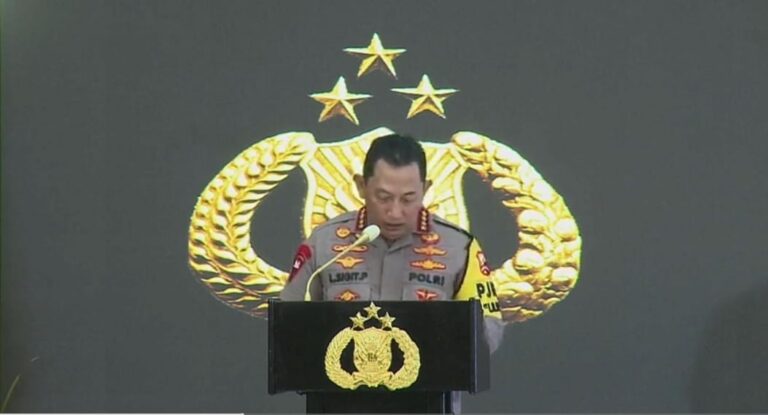
STRATEGIC ASSESSMENT. President Jokowi was reminded the public to be careful in expressing their aspirations in the “political year” leading up to the 2024 elections, in response to a group of young entrepreneurs who expressed their wish for Jokowi to remain Indonesia’s president even past 2024. He said he hoped the public would refrain from making controversial statements that can heighten political tensions in the country.
President Jokowi’s approval rating improved in June as more people believe the economy is recovering, according to a survey by local pollster Charta Politika.
The latest poll showed 68.4% of respondents are satisfied with his performance, recovering from 62.9% in April when there were concerns over the soaring prices of cooking oil and other basic food items.
The survey, which is published every two months, was carried out after Jokowi, as the president is called, held a rally in May to tell his supporters that he was focused on handling issues pertaining to the economy and the pandemic.
The president had moved to ensure ample cooking oil supplies, imposing an export ban of palm oil that was later lifted and issuing quotas for such shipments.
President Jokowi has, once again, attended a rally hosted by his supporter group and told them to be patient ahead of the 2024 presidential election — making it the second time in the past few weeks that he took part in such an event in his second and final term in office.
The rally at Ancol Ecovention Hall in North Jakarta on Saturday was held by a supporter group known as Team 7, which consists of a number of smaller groups backing Jokowi during his reelection campaign in 2019.
Jokowi also told his loyalists not to rush into throwing their support behind any prospective presidential candidates for the 2024 race just yet, particularly since the government was still focusing on addressing more pressing issues such as the economic recovery from the pandemic and inflating commodity prices.
A new poll by Jakarta-based Saiful Mujani Research and Consulting (SMRC) found that Central Java Governor Ganjar Pranowo’s popularity has risen significantly by 4.4 points, up from 18.1 percent in March. The survey shows that Ganjar’s electability rating has continuously risen from 8.8 percent in March 2021 to 22.5 percent in May this year.
Deni Irvani, research director of SMRC, said that Ganjar was garnering continuously rising public support two years before the elections, giving him a better head-start compared with President Jokowi in the lead-up to the 2014 presidential race.
Charta Politika survey results released on Monday showed that Central Java Governor Ganjar Pranowo ranked first in the electability of figures forecast to run as presidential candidates. Meanwhile, Saiful Mujani Research and Consulting (SMRC) survey results noted that Jokowi’s support declined compared to the soaring support for Ganjar.
Some quarters within the Indonesian Democratic Party of Struggle (PDI-P) have proposed that the ruling party field chairman Megawati Soekarnoputri in the presidential election in 2024. This idea has emerged unexpectedly, as the 75-year-old, who was president from 2001 to 2004, had said she wanted to see young faces competing in the next presidential election.
Political parties have already started to form alliances some 20 months before the polls, a move that experts say has advantages and disadvantages for politicians and voters alike.
Researcher Arya Fernandes from the Centre for Strategic and International Studies (CSIS) in an online discussion on Wednesday said that forming alliances early “allows parties to involve the public in nominating their candidates, either at hearings or conventions, [which] gives parties more time to observe trends in voting behavior”.
Edbert Gani, also from the CSIS, said that forming alliances early would also benefit the public, since political parties would be inclined to present their political platforms and campaign promises as early as possible.
The National Awakening Party (PKB) and the Prosperous Justice Party (PKS) have floated the idea of potentially forming a coalition together, unifying moderate and conservative Muslims in what analysts believe could be an effective political machine.
However, doubts remain whether the two sides will actually commit as partners for the 2024 general elections, given their differences. PKS Secretary-General Aboe Bakar Alhabsyi on Thursday said that the party had entered talks with Nahdlatul Ulama-linked PKB after announcing it was open to prospective partnerships for the next elections. A presumptive coalition between PKS and PKB makes up 18 percent of seats in the House.
National Awakening Party (PKB) Chair Abdul Muhaimin Iskandar (Cak Imin) on Sunday expressed his desire to team up with Finance Minister Sri Mulyani as his vice-presidential candidate for the 2024 elections. Muhaimin said Sri Mulyani is suitable because she has the experiences in the economic field.
President Jokowi on Wednesday officially installed two new ministers and three deputy ministers in a cabinet reshuffle in Jakarta. National Mandate Party (PAN) Chair Zuklifli Hasan was appointed as Trade Minister, replacing Muhammad Lutfi; and former Military Commander Marshal (Ret.) Hadi Tjahjanto as Agrarian and Spatial Planning Minister, replacing Sofyan Djalil.
Before his new appointment, Zulkifli was a deputy speaker for the People’s Representative Assembly (MPR), while Hadi advised the government on various issues, including the Mandalika MotoGP event earlier this year. The three new deputy ministers are Raja Juli Antoni as Deputy Agrarian and Spatial Planning Minister, John Wempi Watipo as Deputy Home Affairs Minister, and Afriansyah Noor as Deputy Manpower Minister.
General Elections Commission (KPU) member August Mellaz said the commission will start the countdown towards the 2024 elections, starting today until Feb. 14, 2024. “This is a series of preparations to prepare human resources. There will be a national coordination meeting from June 13 to 15. On June 14, we will host a launching ceremony to mark the start of the 2024 elections implementation phase, taking place at the KPU office,” said Mellaz.








